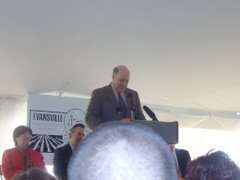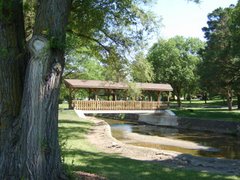Kendall--
At the Plan Commission's public hearing on the 'Wind Committee's' draft ordinance, Eco Energy distributed information directly to the Commission for its review, without it first being given to the appointed Committee to study and evaluate its contents. In fact, Eco has still NOT distributed to me, as Chair of that Committee, even a courtesy copy of what it presented that night. This is despite both public and private assurances of its representatives, including Mr. Bjurlin, that they want to have this debate 'out in the open', and to cooperate with the Committee. Their eleventh hour submissions would seem to cast doubt on such assurances. I objected to this at the time, but it was indeed late, and could not be addressed.
I am coming to you with this issue, as Chair of the Town Board--the entity which appointed the Study Committee. My objection is intended to address ALL current and future submissions, not just those of Eco. Attached is my written objection, with supporting information and argument. I would ask that the Town Clerk, included in this email, distribute this to the Board members, as well as the Commission members. As a courtesy, I would also ask that it be distributed to Mr. Bjurlin. If you have any questions, please feel free to contact me.
Thanks, Tom
-------------------------------------------
Union Township Planning Commission
Evansville, Wisconsin 53536 VIA EMAIL
To The Commission:
Please accept this as my official objection, as Chair of the Large Wind Turbine Study Committee, (hereinafter, the "Committee") to the Union Township Planning Commission (hereinafter, the "Commission") directly accepting documents, information, purported studies, and the like, without first having that information reviewed by the Committee. While this is in specific response to Eco Energy handing out information directly to the Commission last Thursday, it is also meant to apply to any information coming to the Commission at this point in time, without first being reviewed by the Committee. My support for this position is detailed below.
First, the original purpose of the Committee was to research the available information, and, after becoming knowledgeable, if not expert, on the topic, draft an ordinance that would appropriately address the health and safety issues associated with the large wind turbines. As you know, and have recognized, the Committee has invested hundreds of hours, digesting thousands of pages of documents, doing what we were asked to do.
By way of review, we held weekly, OPEN meetings, properly and legally noticed to the public. These meetings were held from late August 2008, through the presentation of the ordinance and accompanying report to the Commission, with only occasional breaks for holidays, and perhaps once or twice when the full Committee could not be in attendance for personal reasons. Additionally, Eco, WPPI and the PSC were among the groups of entities we called 'stakeholders' who were specifically identified and sent individual requests for information. What we received back from Eco, in particular, was mostly non-responsive to our specific requests; the PSC only answered five of our 18 questions. My point here is that Eco, in particular, had EVERY OPPORTUNITY TO BE PART OF THIS PROCESS, but chose, instead, to ignore us. For them to now be allowed to completely circumvent the process, and the Committee, by being allowed to submit information directly to the Commission is not only completely inappropriate by any standard of professional and ethical conduct, it would also be unfair to those on the Committee who worked so hard to bring the Commission the results it asked for.
Furthermore, to invite Eco to be a participating member of a Commission work meeting would be similarly inappropriate. It would reward them for ignoring the Committee's work, and more importantly, the Committee's offer to Eco to be part of the Committee's process. It chose not to. It chose not to attend Committee work meetings. It chose not to be responsive to the questionnaire we sent to them (twice). We went beyond any legal requirements in making our process available to anyone, including Eco. While they certainly have a right to attend any public meeting they want to, they waived any real 'right' to be part of the next step in the process. By analogy, if the Commission recommends passage of the ordinance, as proposed, to the full Town Board, how would the Commission react to the Board dealing directly with Eco, ignoring the Commission, if the Board had questions?
If the Commission intends to preserve the credibility of the appointed committee structure, the Commission MUST insist that Eco (or anyone, at this point, including the Superintendent of Schools) send ANY info, or proposed corrections, through the Committee. To do otherwise completely disrespects the integrity of the Committee, and the committee structure/process. If Eco has a factual issue, then before they get to 'appeal' it, if you will, to the Commission, practice suggests that they must first make the Committee aware of their 'issue', and give us the chance to rectify it. Eleventh hour submissions, with the excuse that until last Thursday, they didn't have the 'opportunity' to present their information, not only amounts to 'trial by ambush' (which is why in the legal system, even in criminal cases, the prosecution must share what it has with the defense BEFORE the trial day, so there are NO SURPRISES, and information can properly be evaluated), but also calls into question the veracity of the submitters.
This is not just a procedural issue, (although that IS how it is done in a court/legal setting), but it makes sense: If Eco ignores us, and brings something directly to the Commission, it denies the Commission of the 'wisdom', knowledge, etc., that the Committee has gained to assess Eco's issue. The Committee has, by design, become the Commission’s expert, and to accept Eco's submissions blindly, and without having the Committee's expertise to assess it, the Commission would be 'accepting' or 'rejecting' it without the benefit of our gained knowledge and experience, etc.
Let me give you a solid example. Today, a study by Mr. Leventhall was distributed to the Committee AND directly to the Commission. At first blush, one might be tempted to ‘accept’ the report at face value, as the Commission has not been part of the Committee’s ongoing vetting of information. However, if the Commission would defer to the Committee it appointed, it would find the following: First, the Committee has already studied information from Mr. Leventhall. That study did NOT include wind turbines at all, particularly, the extremely large one’s that Eco proposes. Second, you would find that Mr. Leventhall’s positions on low frequency sound have NOT been given credence by the larger, scientific community. Third, you would be told that much of Mr. Leventhall’s work is dated, going back as far as 1987, though there is some recent material as late as 2005; subsequent to that, in 2007, a different study that INCLUDED wind turbines, completely refutes Mr. Leventhall’s findings. And finally, if you wanted even more from your Committee, you would find that Mr. Leventhall has been a paid consultant for a number of wind energy companies/proponents. The documents relied on by the Committee have no such bias.
If you allow submissions such as this to come directly to the Commission, you will force the Committee to re-hash the data it has already evaluated, solely to answer the questions raised by the late submitters, but which likely have already been addressed, and often re-addressed, by your Committee. That, Gentlemen, is a waste of everyone’s time and energy, and is simply NOT appropriate. The Committee may look at a 'submission', and say, 'you are right, we'll change it', or it may say the opposite based on what it knows....The Commission needs to accept OUR findings, unless the 'clear weight of the evidence' shows otherwise. That's the deference that should appropriately be afforded a committee such as this. It's not something I'm pulling out of thin air; this is how it works in the legal system.
I want to remind you, and members of the Commission, that I only agreed to Chair this Committee if everyone on the Committee assured me that we would go where the evidence takes us. They did. We did. I'm sorry that some don't like the results. Like Eco has said, 'there are always winners and losers in these projects'.
In closing, therefore, I ask that the Commission officially reject, and refuse to accept submissions by Eco, or any entity, that had notice and opportunity to do so throughout the process, but chose not to. Similarly, if there is new information, ‘hot off the press’, such that it was not available during our Committee’s operational phase, that it, too, be directed to the Committee for evaluation, prior to it being distributed to the Commission. Finally, I ask that the Commission work directly and exclusively with the Committee at work sessions, with the understanding that it is the Committee’s responsibility to interact with the ‘stakeholder’ entities involved, as the Committee has offered to do all along.
Respectfully, Thomas J. Alisankus, J.D.
ChairLarge Wind Turbine Study Committee
Thursday, June 05, 2008
Mailbag; Tom Alisankus files objection with Town of Union Planning Committee
Subscribe to:
Post Comments (Atom)






























From the outside looking in I would contend, and to no fault of the ad hoc committee, that having the Plan Commission or Town Board ignore information from "Stakeholders" solely because that information was not previously divulged to the ad-hoc committee working to draft an ordinance for the benefit of the Plan Commission and the Town Board would sound dangerously like not allowing a stakeholder to argue an alternative conclusion to fact-finder.
ReplyDeleteNothing against the ad-hoc committee and very much appreciating the countless hours and tireless work put into the draft, the ad-hoc committee is not the fact finder in this instance. In all levels of governance many people volunteer many hours to help form legislation that is beneficial or in their best interests, however the legislation process does not stop there. Although it may seem low handed for the "stakeholders" to not share teh information with the ad-hoc committee at first glance there may be legitimate reasons for doing so. First and foremeost I am not certain of any law, statute or ordinance that requires the stakeholders to do so. I suppose if this were a procedural issue in a court of law in a matter being contested via suit then discovery laws would require that, however that is not the case here.
Second, and I am making a guess here, I am pretty confident that the "stakeholders" knew the views of those compromising the ad-hoc committee. I am sorry but if I were playing poker with you I would not show you my cards before I bet and the dealer dealt you your cards.
Realistically the "stakeholders" had their reasons for acting in such a manner, just like the ad-hoc committee did when they drafted an ordiance that makes it virtually impossible for the "stakeholders" to put up wind turbines in the town of Union.
The first comment is well taken, except the "stakeholders" have repeatedly expressed there desire to work with the town. The committee is an extended arm of the town. The "stakeholders" are doing exactly as you mentioned, playing poker, or as I see it, playing games.
ReplyDeleteThis ordinance is about health and safety of the towns residents, the committee has adhered to that using only the "stakeholders" recommended sources. With that information the study committee has compiled what the town currently is looking at.
The "stakeholders" bluff got called.